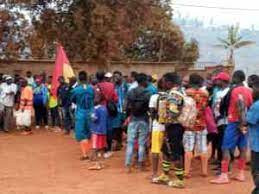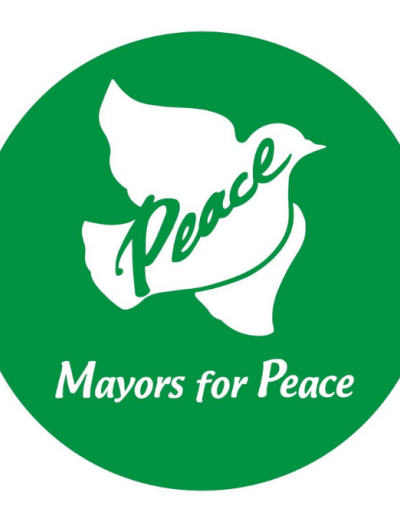In August 1945, single atomic bombs dropped on the cities of Hiroshima and Nagasaki instantly reduced them to rubble, taking more than 210,000 precious lives. With more than 75 years since the bombings, many survivors (hibakusha) still suffer from the physical and emotional aftereffects of radiation. To spread throughout the world the hibakusha’s ardent wish symbolized in the message that “no one should ever suffer as we have”, and to ensure it is passed on to future generations, Hiroshima and Nagasaki remain steadfast in our assertion to the world that nuclear weapons are inhumane and continue to call for their abolition.
On June 24, 1982, at the 2nd UN Special Session on Disarmament held at the UN Headquarters in New York, then Mayor Takeshi Araki of Hiroshima called for cities throughout the world to transcend national borders and join in solidarity to work together to press for nuclear abolition. Subsequently, the Cities of Hiroshima and Nagasaki established “The World Conference of Mayors for Peace through Inter-city Solidarity” (now, Mayors for Peace), composed of mayors around the world who formally expressed support for this call. In 1991, the organization was registered as a NGO in Special Consultative Status with the UN Economic and Social Council (ECOSOC).
The purposes of the "Mayors for Peace" are to contribute to the attainment of lasting world peace by arousing concern among citizens of the world for the total abolition of nuclear weapons through close solidarity among member cities as well as by striving to solve vital problems for the human race such as starvation and poverty, the plight of refugees, human rights abuses, and environmental degradation.
For almost five years, the North-West and South-West regions of Cameroon have been experiencing a security crisis due to separatist demands. Armed groups are swarming these regions and are calling for the separation of these regions from Cameroon to create a state that they would call "Ambasonie". The geographical location of Fongo-Tongo makes it a town bordering these regions. It shares a large boundary with several villages in these regions. Thus, since the beginning of this crisis, we have observed incursions of these separatists in our town, which disturb the peace of the inhabitants. In addition, there are displaced people who find refuge in the homes of hospitable inhabitants. This situation also creates a climate of food insecurity and under-schooling.

The municipality of Fongo-Tongo is doing its best to provide solutions and assistance to the war-displaced. To this end, the vigilance committees (youth initiatives for the maintenance of order) are supported by the town hall. Actions to support the socio-economic reintegration of the displaced are carried out, in particular the support of the municipality in cash given to the families hosting the displaced in order to meet their food needs. The municipality is also working to improve the health system and facilitate access to health care. The displacement of these populations leads to problems with schooling for the youngest. It is therefore also necessary to intervene with educational structures in order to facilitate their access to education. However, the demand is growing as the conflict continues.
The municipality therefore plans to create income-generating activities for the displaced people so that they can take care of themselves. We can mention agricultural and livestock activities, which are of great interest to the young victims of these crises. We also have a support component for access to basic health care, which should not be overlooked, as well as facilitating access to education for young people. These actions, if carried out in an effective and participatory manner, can make a significant contribution to restoring a climate of peaceful cohabitation and resolving the problem of the crisis.

For almost five years, the North-West and South-West regions of Cameroon have been experiencing a security crisis due to separatist demands. Armed groups are swarming these regions and are calling for the separation of these regions from Cameroon to create a state that they would call "Ambasonie". The geographical location of Fongo-Tongo makes it a town bordering these regions. It shares a large boundary with several villages in these regions. Thus, since the beginning of this crisis, we have observed incursions of these separatists in our town, which disturb the peace of the inhabitants. In addition, there are displaced people who find refuge in the homes of hospitable inhabitants. This situation also creates a climate of food insecurity and under-schooling.
The municipality of Fongo-Tongo is doing its best to provide solutions and assistance to the war-displaced. To this end, the vigilance committees (youth initiatives for the maintenance of order) are supported by the town hall. Actions to support the socio-economic reintegration of the displaced are carried out, in particular the support of the municipality in cash given to the families hosting the displaced in order to meet their food needs. The municipality is also working to improve the health system and facilitate access to health care. The displacement of these populations leads to problems with schooling for the youngest. It is therefore also necessary to intervene with educational structures in order to facilitate their access to education. However, the demand is growing as the conflict continues.
The municipality therefore plans to create income-generating activities for the displaced people so that they can take care of themselves. We can mention agricultural and livestock activities, which are of great interest to the young victims of these crises. We also have a support component for access to basic health care, which should not be overlooked, as well as facilitating access to education for young people. These actions, if carried out in an effective and participatory manner, can make a significant contribution to restoring a climate of peaceful cohabitation and resolving the problem of the crisis.
The fight against deforestation is one of the main concerns of the current mayor's office. We are dismayed to see that the lowlands that were once full of yards are now increasingly dried out. These shallows have always been occupied by a species of palm trees that helped to maintain humidity and produce water that is useful for all life. These palm trees were also able to absorb CO2 and thus combat global warming. But because of their ignorance, people in their growing quest for food found themselves destroying these plants in order to exploit the areas they occupied for agriculture. However, as they are destroyed, the amount of water needed to feed the plants created decreases. This leads to the gradual disappearance of rivers, and naturally to global warming. And if nothing is done, this city is exposed to food shortages in the long term.

The fight against deforestation is one of the main concerns of the current mayor's office. We are dismayed to see that the lowlands that were once full of yards are now increasingly dried out. These shallows have always been occupied by a species of palm trees that helped to maintain humidity and produce water that is useful for all life. These palm trees were also able to absorb CO2 and thus combat global warming. But because of their ignorance, people in their growing quest for food found themselves destroying these plants in order to exploit the areas they occupied for agriculture. However, as they are destroyed, the amount of water needed to feed the plants created decreases. This leads to the gradual disappearance of rivers, and naturally to global warming. And if nothing is done, this city is exposed to food shortages in the long term.
The municipality, having understood all these issues, has recently launched an awareness campaign which should intensify over time. It is a question of adding to this awareness campaign two essential actions, namely: the resettlement of farmers who have occupied the land of these bamboos and a campaign to replant these palms and bamboos. This will enable the ecosystem to be reconstituted and agricultural production to be improved without hindering the survival of future generations.


The municipality, having understood all these issues, has recently launched an awareness campaign which should intensify over time. It is a question of adding to this awareness campaign two essential actions, namely: the resettlement of farmers who have occupied the land of these bamboos and a campaign to replant these palms and bamboos. This will enable the ecosystem to be reconstituted and agricultural production to be improved without hindering the survival of future generations.
In view of the existence and expansion of armed conflicts throughout Africa, which hinders the development of African countries, and the desire of Mayors for Peace to expand its activities and involve more and more African municipalities, it seems necessary to set up a more organised and autonomous structure. This would allow direct action at the local level to prevent conflicts and better coordination of mayors' activities at the African level to stimulate sustainable development in Africa. There are certainly actions carried out by our organisation, but they remain somewhat disparate and without real follow-up. We are considering setting up a structure that would allow us to plan the activities to be carried out and to carry out a real follow-up and evaluation of the actions carried out on a regular basis.
To achieve this, we believe it is necessary to organise a forum of mayors for peace in Africa as early as next year in 2022. This forum would make it possible to define the objectives and the strategy to be adopted in order to better coordinate the actions of this organisation in Africa. Feasibility studies are currently being finalised to determine the host country, participants, duration, practical arrangements and so on. These studies will also allow us to determine the estimated cost and explore sources of funding.
This forum will lay the foundations for a new approach to the management of this structure and thus improve the image of Mayors for Peace. This will enable us to obtain more member cities and achieve the objectives of Mayors for Peace more effectively.

In view of the existence and expansion of armed conflicts throughout Africa, which hinders the development of African countries, and the desire of Mayors for Peace to expand its activities and involve more and more African municipalities, it seems necessary to set up a more organised and autonomous structure. This would allow direct action at the local level to prevent conflicts and better coordination of mayors' activities at the African level to stimulate sustainable development in Africa. There are certainly actions carried out by our organisation, but they remain somewhat disparate and without real follow-up. We are considering setting up a structure that would allow us to plan the activities to be carried out and to carry out a real follow-up and evaluation of the actions carried out on a regular basis.
To achieve this, we believe it is necessary to organise a forum of mayors for peace in Africa as early as next year in 2022. This forum would make it possible to define the objectives and the strategy to be adopted in order to better coordinate the actions of this organisation in Africa. Feasibility studies are currently being finalised to determine the host country, participants, duration, practical arrangements and so on. These studies will also allow us to determine the estimated cost and explore sources of funding.
This forum will lay the foundations for a new approach to the management of this structure and thus improve the image of Mayors for Peace. This will enable us to obtain more member cities and achieve the objectives of Mayors for Peace more effectively.
Disclaimer
The ideas and opinions expressed on this page are those of the Member State; they do not necessarily represent the views of UNESCO and the Organization hereby declines all liability. The designation employed and the presentation of material throughout the National Pavilion or this webpage do not imply the expression of any opinion whatsoever on the part of the Organization, concerning the legal status of any country, territory, city or area of its authorities, or concerning its frontiers or boundaries.






